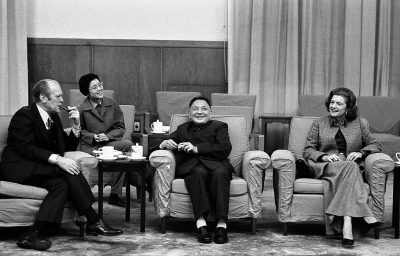Power Concentration in China: Deng Xiaoping Warned (Xi Jinping)
Kanako Mita, Sawako Utsumi, and Lee Jay Walker
Modern Tokyo Times

Deng Xiaoping fundamentally transformed China from a rigid one-party state dominated by the absolute authority of a single leader into a more pragmatic political system focused on modernization and improving the livelihoods of ordinary citizens. The upheaval and suffering caused by the Cultural Revolution made clear the dangers of concentrated power and ideological extremism. In Deng’s view, the era of Mao Zedong should never again jeopardize China’s progress, nor should the people be subjected to the arbitrary rule of a leader who governs without checks or limits.
However, under President Xi Jinping, there are growing concerns that the political norms established by Deng are being eroded. Xi’s centralization of power, abolition of term limits, and the cult of personality surrounding his leadership signal a shift away from the collective leadership model Deng sought to establish.
Therefore, the Chinese Communist Party (CCP) must reaffirm the guiding principles introduced by Deng, especially in the context of 2019 and beyond. If not, the legacy of power restraint and institutional balance may be overturned, risking a return to authoritarian excess and potentially stalling China’s modernization efforts.
Deng emphasized the importance of term limits and the orderly succession of leadership as safeguards against the rise of another unchecked ruler. While his response to the Tiananmen Square protests in 1989 was harsh, Deng believed that the CCP was essential for maintaining stability and lifting millions out of poverty. He feared that internal political chaos and external interference could fragment China and derail its development.
Deng said, “China is not a superpower, nor will she ever seek to be one… If one day China should change her color and turn into a superpower, if she too should play the tyrant in the world, and everywhere subject others to her bullying, aggression and exploitation, the people of the world should identify her as social-imperialist, expose it, oppose it and work together with the Chinese people to overthrow it.”
Deng warned, “It is not good to have an over-concentration of power.”
In 2018, the BBC reported that “China’s governing Communist Party has proposed removing a clause in the constitution which limits presidencies to two five-year terms,” signaling a significant shift in the country’s political framework.
These developments raise serious concerns about the future of social liberalization in China. The consolidation of power under a single leader threatens not only the political balance within the Communist Party but also the civil liberties of Chinese citizens. If Xi continues to centralize authority, religious freedoms are likely to face greater suppression, and political dissent could be met with increasingly harsh crackdowns.
The Guardian also reported in 2018: “The growing supremacy of Xi, 64, who took power in late 2012, was underlined in a second Xinhua report that announced a body of political philosophy bearing his name, Xi Jinping Thought, would also be written into China’s constitution. The philosophy was added to the Communist Party’s charter last October, a move experts said effectively anointed Xi as China’s most powerful leader since Mao, who ruled between 1949 and his death in 1976.”
America’s containment strategy toward China—including its stance on Taiwan, the imposition of economic sanctions, and increased military activity in the Indo-Pacific—has inadvertently strengthened Xi’s narrative. Xi portrays these external pressures as deliberate attempts to hinder China’s economic rise and curb its legitimate influence in regions such as Central Asia, Northeast Asia, the Mekong Delta, and the South China Sea. In contrast to Deng, who operated in a relatively more cooperative global environment, Xi is navigating a period marked by growing tensions with Washington. Additionally, recent governments in Australia and Japan have aligned more closely with U.S. policy concerning the containment of China, further escalating regional friction and reinforcing Xi’s argument that China is under siege by foreign powers.
If Xi chooses to retain power indefinitely and pursue policies rooted in personal dominance, the gains in openness and reform made under Deng may be reversed. Accordingly, the Chinese Communist Party must carefully consider the long-term consequences of endorsing unchecked authority.
Concentrated power in the hands of a single leader not only risks stifling modernization but also undermines the political stability that Deng’s reforms were meant to safeguard.

Modern Tokyo News is part of the Modern Tokyo Times group
http://moderntokyotimes.com Modern Tokyo Times – International News and Japan News
http://sawakoart.com – Sawako Utsumi’s website and Modern Tokyo Times artist
https://moderntokyonews.com Modern Tokyo News – Tokyo News and International News
PLEASE JOIN ON TWITTER
https://twitter.com/MTT_News Modern Tokyo Times
PLEASE JOIN ON FACEBOOK